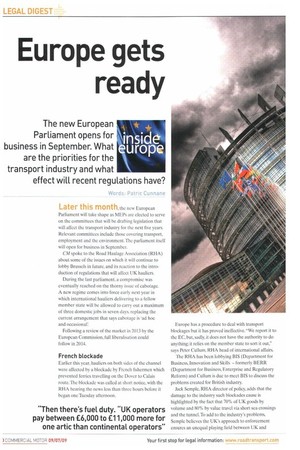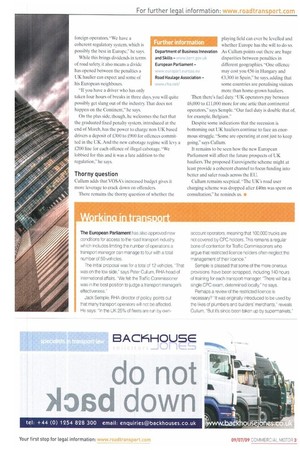Europe gets ready
Page 30

Page 31

If you've noticed an error in this article please click here to report it so we can fix it.
The new European Parliament opens for business in September. What are the priorities for the transport industry and what effect will recent regulations have?
insi&r europe
Words: Patric Cunnane
Later this month, the new European Parliament will take shape as MEPs are elected to serve on the committees that will be drafting legislation that will affect the transport industry for the next five years. Relevant committees include those covering transport, employment and the environment.The parliament itself will open for business in September.
CM spoke to the Road Haulage Association (RHA) about some of the issues on which it will continue to lobby Brussels in future, and its reaction to the introduction of regulations that will affect UK hauliers.
During the last parliament, a compromise was eventually reached on the thorny issue of cabotage. A new regime comes into force early next year in which international hauliers delivering to a fellow member state will be allowed to carry out a maximum of three domestic jobs in seven days. replacing the current arrangement that says cabotage is 'ad hoc and occasional'.
Following a review of the market in 2013 by the European Commission, full liberalisation could follow in 2014,
French blockade
Earlier this year, hauliers on both sides of the channel were affected by a blockade by French fishermen which prevented ferries travelling on the Dover to Calais route. The blockade was called at short notice, with the RHA hearing the news less than three hours before it began one Tuesday afternoon. Europe has a procedure to deal with transport blockages but it has proved ineffective. "We report it to the EC, but, sadly, it does not have the authority to do anything; it relies on the member state to sort it out," says Peter Cullum, RHA head of international affairs.
The RHA has been lobbying BIS (Department for Business. Innovation and Skills — formerly BERR (Department for Business. Enterprise and Regulatory Reform) and Cullum is due to meet BIS to discuss the problems created for British industry.
Jack Semple, RHA director of policy, adds that the damage to the industry such blockades cause is highlighted by the fact that 70% of UK goods by volume and 80% by value travel via short sea crossings and the tunnel. To add to the industry's problems, Semple believes the UK's approach to enforcement ensures an unequal playing field between UK and foreign operators. "We have a coherent regulatory system, which is possibly the best in Europe," he says.
While this brings dividends in terms of road safety, it also means a divide has opened between the penalties a UK haulier can expect and some of his European neighbours. I vna.ia:_ "If you have a driver who has only taken four hours of breaks in three days, you will quite possibly get slung out of the industry. That does not happen on the Continent," he says.
On the plus side, though, he welcomes the fact that the graduated fixed penalty system, introduced at the end of March, has the power to charge non-UK based drivers a deposit of £300 to £900 for offences committed in the UK. And the new cabotage regime will levy a £200 fine for each offence of illegal cabotage. "We lobbied for this and it was a late addition to the regulation," he says.
Thorny question ciiii um adds that VOSA's increased budget gives it more leverage to crack down on offenders.
There remains the thorny question of whether the playing field can ever be levelled and whether Europe has the will to do so. As Cullum points out there are huge disparities between penalties in different geographies. -One offence may cost you €56 in Hungary and €3,300 in Spain,he says, adding that some countries are penalising visitors more than home-grown hauliers.
Then there's fuel duty. "UK operators pay between £6,000 to £11,000 more for one artic than continental operators," says Semple. "Our fuel duty is double that of, for example, Belgium."
Despite some indications that the recession is bottoming out UK hauliers continue to face an enormous struggle. Some are operating at cost just to keep going," says Cullum.
It remains to be seen how the new European Parliament will affect the future prospects of UK hauliers.The proposed Eurovignette scheme might at least provide a coherent channel to focus funding into better and safer roads across the EU.
Cullum remains sceptical. "The UK's road user charging scheme was dropped after £40m was spent on consultation," he reminds us. •












































































































































